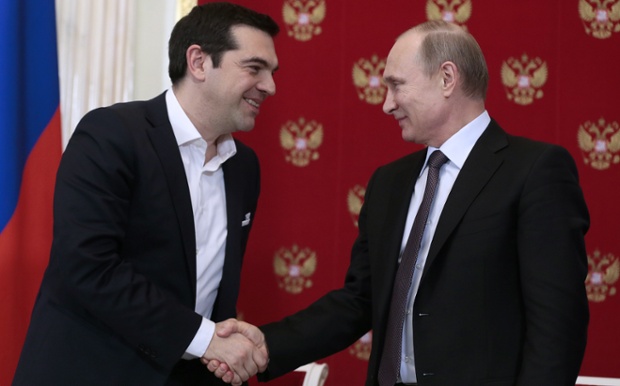Alwaght- Russia and Greece enjoy historically close relationships, particularly at religious background. Thanks to
common religious and cultural backgrounds, they have developed strong ties, both countries helped one another during World War II to fight back Nazis.
The close ties between the two countries continued even after the collapse of
the Soviet Union. So, Greece as a member of NATO and Russia as the heir to the
Communist League, apart from the traditional perception of the Cold War kept strengthening their
relationship. After a while, they
established extensive economic ties and signed various arm treaties over
military
cooperation. The relationship was so
warm that Greece has been referred to as the Trojan horse of Russia in Europe. Although this approach
has met with some challenges in some sections, it seems that once again the
leftist government of Greece, which has recently gained power, tends to restore his warm relations with
Russia.
Accordingly, Alexis
Cyprus, the Greek prime minister, went on a trip to Moscow and met President
Vladimir Putin, while Athens faced with financial crisis and debt repayments has
run into fundamental problems with Brussels. That's why many
European officials believe the Moscow-Athens visits aim to strengthen their
political union in disagreement with Europe. However, contrary to
the predictions of the European leaders, Cyprus on his visit to Moscow, did not
discussed financial support and its debts. Nevertheless, the current Prime
Minister of Greece follows a procedure different from that of other European
countries and tends to develop close ties with Russia, more than ever before.
The Greek administration
believes that sanctions
against Russia are detrimental to Greek producers, while Greece has no
political problems in its bilateral ties with Moscow, and believes Greece should
not follow the sanctions. Accordingly, while the trade relations between the two countries in
2014 declined about 40%, they are likely to resume their relations in future. Further, Russia is interested in investing in Greece and restoration of its tainted
economic relations with Greece. Russia tends to play a greater role in Greek
industries and participate in tenders with equal rights. Russia can also resume
importing Greek agricultural products ceased due to sanctions. Opening the way for the
Greek agricultural products, whose major products are agricultural ones, would play
an important role in its economy. Furthermore, Greece imports from Russia about 65 percent of its
natural gas, and looks to cheap Russian gas, hoping that Moscow will reduce the
gas price.
On the other hand,
Russia intends to share with Greece the Turkish gas pipeline. If Greece is connected
to Turkey gas line, the line would have the potential to become the
largest European gas highway and assume a significant role in its geopolitics. In return, Moscow hopes to win the support of Greek in preventing more
sanctions that might be imposed by the European Union this summer. Besides, it
will be to Russia’s benefit if Greece withdraws from the European Union, as it will cause economic
chaos in EU. The more the European countries are concerned with their own issues,
the less will they support Petro Poroshenko government in Ukraine. Furthermore, the
possible withdrawal of Greece from the EU may impact Greece’s role in NATO.
Although Greece has not
decided to leave the European Union, makes attempts to demonstrate that has
some allies outside the EU so that it can put Brussels under pressure
about the repayment of its debts. The Greek administration
tries to indirectly give the message to Europe that Greece as an independent
country plans to cooperate with countries outside the E U. Therefore, considering the possible
consequences of its withdrawal from the EU, the Greek administration tries to put the EU under pressure as much as
possible. To the extent that, on the one hand calls for cancelling its debts
and receiving assistance from EU, and the other hand, as leverage against
Germany, demands compensation for the economic and financial losses resulted
from the occupation of Greece by Hitler regime.
In any event, the fact
that Greece does not agree with the general policies of the EU, can cause split
in the unity of Europe. Especially in recent months, the discontent of some countries such
as Britain with their membership in Europe has increased, and some other
countries, such as Spain, Portugal and France are on the verge of major
political changes in which extremist right and left are likely to assume power which
are against the existence of EU and call for closer ties with Moscow. As the Ukraine crisis, and
the
annexation of the Crimean peninsula into Russian territory have largely
isolated Russia in Europe, this is a suitable opportunity for Moscow to show the
EU and USA that Russia has some allies in the heart of Europe. Accordingly, Russia would
like to have Greece, in addition to Serbia, Hungary and Cyprus, as a friend or
ally on its side, and also as a new geopolitical advantage in the heart of
Europe. Now, Greece can once again play the role of a Trojan horse for
Russia.



























